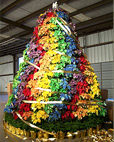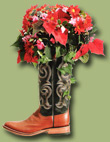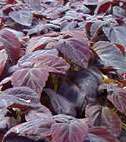Poinsettia Toxicity Myth
TSFA: FOR IMMEDIATE RELEASE: November 27, 2002
The Myth of the Poinsettia Plant
As the holiday season approaches the yearly tradition of decorating
homes and offices is in full swing. One of the most common items
that Americans use in their seasonal decorating is the poinsettia
plant, but some may steer away from this tradition, as they fear
that the plant is toxic. The following dispels those rumors:
-
Scientific research from the Ohio State University
has proven the poinsettia to be non-toxic to both humans and
pets. All parts of the plants were tested, including the leaves
and sap.
-
According to POISINDEX, the national information
center for poison control centers, a child would have to ingest
500-600 leaves in order to exceed the experimental doses that
found no toxicity.
-
A study by the Children’s Hospital in Pittsburgh
and Carnegie Mellon University found that out of 22,793 reported
poinsettia exposures there was essentially no toxicity significant
of any kind. The study used national data collected by the American
Association of Poison Control Centers.
-
As with non-food product, however, the poinsettia
is not meant to be eaten
and can cause varying degrees of discomfort; therefore; the
plant should
be kept out of the reach of young children and curious pets.
-
“The professional members of the Texas
State Florists’ Association would like to inform the public
that the poinsettia plant is a safe and a beautiful way to decorate
for the holidays,” stated John Priest, President of the
Texas State Florists’ Association.
Poinsettia Falsely Accused
Since 1919, stories unconfirmed by medical or scientific fact
have circulated about the poinsettia. According to one tale, the
2-year-old child of an Army officer stationed in Hawaii died from
eating a poinsettia bract (leaf). There was never any medical documentation
to back up this story. Even though it was proved unfounded, it has
helped scare people into thinking that the poinsettia is poisonous.
It has led to the belief that parts of the plant, if ingested by
humans or pets, could be lethal.
Research Conducted
To alleviate the public’s fear concerning the poinsettia’s
alleged toxicity, the floral industry launched a scientific investigation.
The objective: to determine whether there is any truth to the charge
that the poinsettia (scientific name: euphoria pulcherrima) is poisonous.
The Society of American Florists (SAF), the national trade association
representing all facets of the floral industry, collaborated with
The Ohio State University on this poinsettia research project.
The research was conducted by Robert P. Stone and
W.J. Collins, members of the Academic Faculty of Entomology at The
Ohio State University. They established that the rat, when given
unusually high doses of various portions of the poinsettia, shows
no mortality, no symptoms of toxicity, and no changes in dietary
intake or general behavioral patterns.
Animal tests are accepted as valid by the United States
Consumer Product Safety Commission in determining whether any product
or natural growth is harmful to human health. Thus, if a product
is found to be harmful, it is subject to labeling as require by
the Federal Hazardous Substances Act.
The Ohio State University research on the poinsettia
plant effectively disproved the charge that the poinsettia is harmful
to human and animal health if parts of the plant are ingested.
Support For the Poinsettia
American Medical Association - According to the AMA Handbook
of Poisonous and Injurious Plants, the poinsettia has been found
to produce either no effect, orally or topically, or occasional
cases of vomiting.
The POISINDEX
The POISINDEX Information Service, the primary information resource
used by the majority of poison control centers around the country,
states that a 50 pound child would have to ingest one and one quarter
pounds of poinsettia bracts (500 to 600 bracts) to surpass experimental
doses. At those levels there was no toxicity.
Government
In 1975, the Consumer Product Safety Commission was petitioned by
a citizen who demanded that poinsettias carry caution labels when
offered for sale to the public. After reviewing all available information
relating to the poinsettia, the Commission denied the petition.
The Commission pointed out that poinsettia bracts, like leaves of
many other plants, may cause varying degrees of discomfort if eaten
and should be placed out of the reach of small children.
- Information is provided by SAF
|











